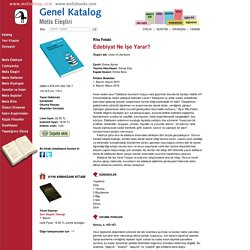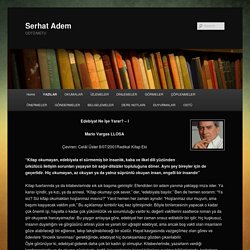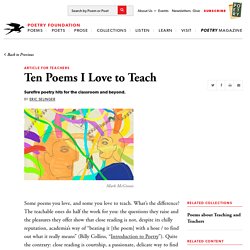

Edebiyat Ne İşe Yarar?, Rita Felski, Metis Yayınları. Edebiyat Ne İşe Yarar?

Özgün adı: Uses of Literature İnsan neden okur? Edebiyat okumanın hoşça vakit geçirmek dışında bir faydası olabilir mi? Üniversitelerde neden edebiyat bölümleri vardır? Edebiyatın iyi ahlak sahibi, entelektüel bakımdan gelişmiş bireyler yetiştirmeye hizmet ettiği söylenebilir mi hâlâ? Felski'ye göre okur ile edebiyat arasındaki etkileşim dört tarzda gerçekleşiyor: Okurun kendini kitapta bulduğu, kendini öteki olarak teşhis ettiği tanıma süreci, yapıtın içine çekildiği ve etkisinden kurtulamadığı büyülenme süreci, geçmişe veya başka yerlere dair bir şeyler öğrendiği bilgi amaçlı okuma tarzı ve okuru şaşırtarak verili olan üstüne düşündürmek isteyen yapıtın başvurduğu şok stratejisi. Edebiyat Ne İşe Yarar? TeşekkürGiriş1 Tanıma2 Büyülenme3 Bilgi4 ŞokSonuçDizin Sonuç, s. 163-167. Okur tepkisinin düğümlerini çözerek tek tek tutamlara ayırmak ve bunları daha yakından görmek için birer birer mikroskop altına tutmak, kuşkusuz, son derece eğreti bir işlemdir.
Edebiyat Ne İşe Yarar? Edebiyat Ne İşe Yarar?

– I Mario Vargas LLOSA Çeviren: Celâl Üster 8/07/2001Radikal Kitap Eki “Kitap okumayan, edebiyata el sürmemiş bir insanlık, kaba ve ilkel dili yüzünden ürkütücü iletişim sorunları yaşayan bir sağır-dilsizler topluluğuna döner. Aynı şey bireyler için de geçerlidir. Kitap fuarlarında ya da kitabevlerinde sık sık başıma gelmiştir: Efendiden bir adam yanıma yaklaşıp imza ister. Edebiyat bir ortak paydadır Bilim ve teknolojinin olağanüstü gelişmesi, böylece bilginin sayısız parça ve bölümlere ayrılması sonucunda, bilginin uzmanlaştığı bir dönemde yaşıyoruz.
Geçmişe kurulan köprü İsaiah Berlin’in deyişiyle, bu çelişkili doğruların karmaşık toplamı, insanlık durumunun özünü oluşturur. Dil ile oluşturulmuş bir hayat “Edebiyat ne işe yarar?” Edebiyatın ilk yararlı etkilerinden biri, dil düzeyinde gerçekleşir. Edebiyat, aşkın, tutkunun ve cinselliğin sanatsal yaratı niteliği edinmesine bile katkıda bulunmuştur.
Bilgisayar kitap olabilir mi? Edebiyat Ne İşe Yarar? Poems. Poems and songs. 24 Must-Share Poems for Middle School and High School. It can be hard to know which poems will spur your middle and high schoolers into deep, meaningful discussion and which will leave them, ahem, yawning. So we asked experienced teachers to share their favorites—the punch-in-the-gut poems that always get a reaction, even from teens. Here’s what they had to say about the best poems for middle school and high school students. 1. Snow by David Berman Captures a narrative in miniature with a creative structure. 2. Students won’t soon forget this poem, both for the story and the sensory details. 3. Read this poem to discuss the meaning beyond the literal words on the page. 4.
Frost doesn’t hold back with this poem, an ideal one for discussion and debate. 5. Teach this poem for how O’Hara uses references or for the humor. 6. Lehman engages with popular culture and an irreverent tone. 7. A politically charged poem that still rings true today, Hughes’ poetry, but particularly Mother to Son, is timeless. 8. 9. 10. 11. 12. 13. 14. 15. 16. 17. 18. 19. 20.
24 Must-Share Poems for Middle School and High School. Ten Poems I Love to Teach by Eric Selinger. Some poems you love, and some you love to teach.

What’s the difference? The teachable ones do half the work for you: the questions they raise and the pleasures they offer show that close reading is not, despite its chilly reputation, academia’s way of “beating it [the poem] with a hose / to find out what it really means” (Billy Collins, “Introduction to Poetry”). Quite the contrary: close reading is courtship, a passionate, delicate way to find out what makes this particular poem worth a second date (that is, writing a paper about) or maybe worth spending the rest of your life with (that is, memorizing). Here are ten poems that have the moves my students want to know better, with a couple of tips on how to catch their eyes across the dance floor. 1. Like most interesting people, the characters you meet in poems rarely say the same thing twice. 2. No one could miss the desire in this one! 3. 4.